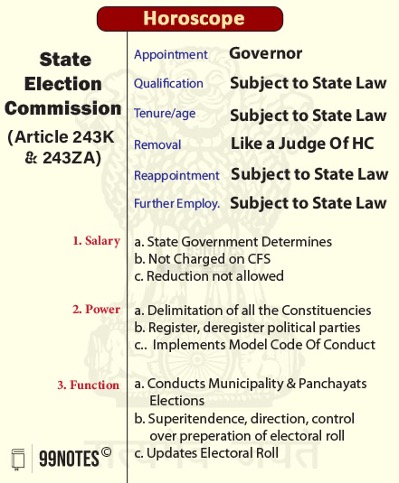State Election Commission- UPSC Notes
State Election Commission
- State Election Commission
- Constitution of State Election Commission
- Composition of State Election Commission
- Appointment and Removal of the State Election Commission
- Powers and Functions of State Election Commission:
- Comparison between the Election Commission of India(ECI) and the State Election Commission
- Challenges with the Functioning of the State Election Commission
- Suggestions for Reforms in State Election Commission (SECs)
- FAQs related to State Election Commission
The State Election Commission is an autonomous and constitutional body authorized to conduct elections for local governance, which includes the rural Panchayati Raj Institutions and the Urban Local Bodies.
Before 1992, elections to these bodies were conducted by the respective State Governments. The Constitution was amended in 1992 through the 73rd and 74th amendments in order to provide legal sanctity to the Local Self-Governments (LSGs), giving LSGs their rightful place in the process of nation-building.
Article 243K & Article 243ZA provides for establishing a State Election Commission in every state as a constitutional authority with powers of ‘superintendence, direction and control of the electoral roll preparation for, and the conduct of elections to the rural Panchayats and urban Municipalities in the state.
Constitution of State Election Commission
Part IX- the panchayats and Part IXA- the municipalities of the Indian Constitution deal with rural local government and urban local government, respectively. Article 243K under Part IX & Article 243ZA under Part IXA deals with State Election Commission in every state.
Article 243K of the Indian Constitution states:
- The State Election Commission will be responsible for the superintendence, direction and control of the electoral roll preparation for rural panchayats. It shall also be responsible for the conduct of elections to the rural Panchayats.
- Subject to the rules of any law made by the State Legislature, tenure of office and the conditions of service of the State Election Commissioner shall be determined by the Governor.
- The State Election Commissioner shall not be removed from office except in like manner and on the like grounds as a High Court The conditions of service of the State Election Commissioner(SEC) shall not be varied to his disadvantage after his appointment.
Article 243ZA of the Indian Constitution states that:
- Under Article 243ZA, the state election Commission will be responsible for the superintendence, direction and control of the electoral roll preparation for the election of the municipalities. It also conducts polls of the municipalities.
- Subject to the provisions of the Constitution, the Legislature of a State may, through law, make provisions with respect to matters related to elections to the Municipalities.
Composition of State Election Commission
The State Election Commission comprises a state election commissioner and as many members and staff specified as according to Acts of the respective State. State Election Commissioners shall be independent persons not holding positions or offices in any State or Central Government organizations.
Appointment and Removal of the State Election Commission
The Governor appoints the state election commissioner. To ensure the autonomy and independence of the position, the state election commissioner can only be removed from office on the same grounds and manner specified for a High Court judge.
Powers and Functions of State Election Commission:
The State Election Commission has the following powers and functions:
- The State Election Commission Conducts elections for municipalities in the state.
- The autonomous body conducts elections for panchayats in the state.
- Implement a Model code of conduct in elections for local bodies.
- It updates Electoral rolls with new additions.
- The State Election Commission is also responsible for the delimitation of constituencies for local bodies, which is done before every general election of the local bodies.
- The State Election Commission is also empowered to register and deregister political parties in the state to set up candidates for local body elections.
Comparison between the Election Commission of India(ECI) and the State Election Commission
| Dimension | Election Commission of India | State Election Commission |
| Constitutional provision | Article 324 under Part XV | Article 243K under Part IX & Article 243ZA under Part IXA |
| Function and Power | Conducting elections of the President of India, Vice-President, members of Rajya Sabha, Lok Sabha, State Legislative Assembly and the Legislative Council fairly and transparently. | Conducting elections to the Local Self Government, which includes the rural Panchayati Raj Institutions and the Urban Local Bodies. |
| Qualification | According to the law made by the Parliament | According to the law made by the state legislature |
| Appointment | President | Governor |
| Term | 6 years or until they turn 65, whichever is earlier | According to the law made by the state legislature |
| Composition | Chief Election Commissioner and such other number of Election Commissioners as the President may fix. | State Election Commissioner and as many members and staff specified as are required by the Acts of respective State Governments |
| The annual Report is submitted to | President | Governor |
| Resign to | President | Governor |
| The chairman and members are removed by | President | Governor |
| Conditions for Removal | The chief election commissioner has secured tenure as he can only be removed from his office in the same manner and on the same grounds as a Supreme Court judge. | State Election Commissioner shall not be removed from office except in like manner and ground as a High Court Judge. |
Challenges with the Functioning of the State Election Commission
- Lack of Autonomy: SECs struggled to assert their independence and autonomy. For example, in Maharashtra, the SEC was arrested and sent to jail for two days after the breach of privilege for proposing autonomy for the SEC.
- Lack of security and Safeguard: Allahabad HC in The Aparmita Prasad Singh vs. State of UP (2007) held that if the Governor has the power to prescribe tenure by rule, he also has the discretion to change the rule, either to extend the term or reduce the term.
- Non-Uniform Service Conditions: A separate state Act governs each SEC. This gives states the power to amend rules unilaterally and even take ordinance routes to bypass the legislative process, like the recent example of Andhra Pradesh
- State government interference: This is despite the fact that under the constitutional mandate, the state must not interfere with the working of the State Election Commission(SECs). For example, the Goa government have vested additional charges to the law secretary of an independent constitutional office (State Election Commission)
- Lack of impartiality and Questionable accountability: Often, SECs have been found to be hand in glove with the state government. Appointment of serving bureaucrats in West Bengal. In this regard, SC has observed that giving government employees the additional charge of SEC is a “mockery of the Constitution”.
Suggestions for Reforms in State Election Commission (SECs)
- Judicial Pronouncement: The state governments should follow the guidelines given by the Supreme Court in the Kishan Singh Tomar vs Municipal Corporation of Ahmedabad case.
- The state governments should abide by orders of the SECs during the panchayat and municipal elections, just like they follow the orders of the EC during Assembly and Parliament polls.
- The Supreme Court in 2021 ruled that serving bureaucrats should not be appointed as election commissioners to ensure the independence and autonomy of the office of the election commissioner.
- 2nd ARC:
- The 2nd ARC suggests that the Governor should appoint the State Election Commissioner based on the recommendation of a collegium comprising the CM of State, the Speaker and the Leader of the Opposition of the Legislative Assembly.
- The 2nd ARC proposes the establishment of an institutional mechanism to facilitate the coordination of the sharing of experiences and resources between the ECI and the SEC.
- Law Commission 255th Report on Electoral Reforms: The Report recommended establishing a separate, independent, and permanent Secretariat for the State Election Commission, similar to the Lok Sabha/Rajya Sabha Secretariats under Article 98 to ensure autonomy and fair local body elections.








